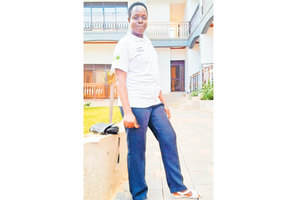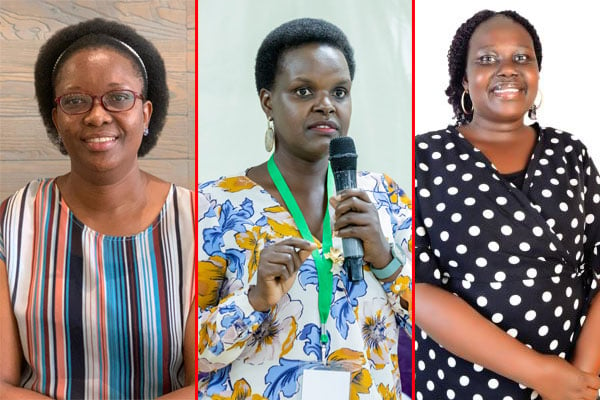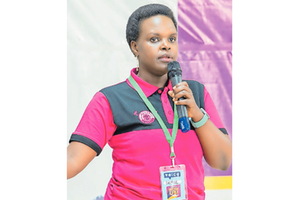
MS Rose Achieng, a 55-year-old teacher at Gayaza Primary School, who recovered from cancer. PHOTO | BEATRICE NAKIBUUKA
In 2015, Rose Achieng, a dedicated 55-year-old teacher at Gayaza Primary School, felt an unsettling swelling in her right breast. Driven by concern, she sought reassurance through a mammogram, only to be met with negative results.
A mammogram is an X-ray examination of the breast.
Unfazed, she continued her pursuit of answers at Mulago National Referral Hospital, where a series of tests repeatedly came back negative for cancer. Yet, a nagging fear began to take root in her heart, casting shadows over her everyday life.
A Christmas to remember
The holiday season of 2017 was meant to be joyful. While attending a Christmas festival in Tororo, Rose awoke to a sudden and alarming pain in her breast.
Panic-stricken, she hurried back to Gayaza, then straight to Mulago Hospital. After examination, the doctor delivered a devastating diagnosis: the lump removed from her breast was cancerous.
“I felt my world collapse,” she recalled, tears welling in her eyes.
“The doctor insisted I needed to have my entire breast removed immediately to prevent the cancer from spreading. I was terrified, but also felt I had no choice.”
A painful decision
Faced with this grim reality, Rose called her husband, who was busy managing his business in Nebbi, asking him to come home without delay. The urgency of the situation was compounded when the doctor demanded a staggering Shs2 million for the surgery, promising to perform it at his clinic in Kiteezi.
“After the surgery, I was in shock. The doctor wanted to discharge me that very evening, but we pleaded to stay one more night,” she recounted, with the trauma of the experience still vivid in her memory.
“I was devastated looking at the remnants of my breast, which the doctor gave to us and the next day, my husband had to take it to Mulago Hospital for testing.”
Mistrust and confusion
At Mulago, the same doctor asked for an additional Shs300,000 for transport and spun a web of lies about the testing, claiming it would be sent to America. He further advised Achieng against seeking help from the Uganda Cancer Institute, insisting that the surgery alone was enough.
The diagnosis turned their lives upside down. The two had planned to have their holy matrimony in 2017 and had their first wedding planning meeting, but when the diagnosis of cancer came, it put all the plans to a halt. This state of confusion did not only affect the couple, but their children too.
“My daughter was inconsolable, fearing for my life. Her school performance plummeted,” Rose lamented. Even in her weakened state, she mustered the strength to visit her daughter’s school and reassure her that everything would be alright.
A family in crisis
Achieng’s husband faced his own battles, as his business crumbled under the weight of his absence. With no income and a family to support, they spiralled into poverty. “I was too weak to work, and I feared people would notice my physical changes. Our situation felt hopeless,” she said, her voice tinged with despair.
For two long years, she oscillated between confusion and despair, struggling to step back into her role as a teacher. She often found herself wandering to the cancer institute, seeking solace among fellow patients, even when she had no appointments.
A catalyst for change
One day, she met Leah, a patient navigator who urged her to open a file and start cancer treatment.
“I was terrified. The patients I spoke to painted a grim picture of cancer,” she recalled. Despite Leah’s encouragement and repeated counselling, Achieng initially resisted, believing she could conquer the disease on her own.
She existed in a state of denial, waiting for a death that seemed perpetually out of reach. But in 2018, something shifted within her.
“I finally went to the cancer institute and told the doctor I was ready to start treatment,” she said, the memory still tinged with anxiety.
The turning point
Unfortunately, the doctor needed a next of kin present for her to begin treatment. With her husband’s business in ruins, he had returned to their village. Undeterred, Achieng sought help from a fellow teacher, who accompanied her to the hospital. There, she signed an agreement committing to treatment, determined to fight for her life.
The first cycle of chemotherapy was bearable, but by the fifth day, reality hit hard. “All my hair fell out, my veins turned black, and I experienced relentless vomiting,” she remembered.
Prepared for the worst, she drank 15 litres of fruit juice daily and filled her diet with fruits, avoiding anything artificial.
“I thought the herbs people suggested would save me,” she reflected.
The path to recovery
But death did not come, and Achieng found herself at the cancer institute again, ready to reclaim her life. Her chemotherapy journey was gruelling but manageable; after eight cycles, she felt a flicker of hope as she prepared for radiotherapy.
“My appointments were set for 5am, and every day, I would catch a taxi from Gayaza by 3:30am to ensure I arrived on time,” she shared, her dedication evident.
After 25 days of radiotherapy, she completed this phase of treatment. The doctor informed her that she would need to take daily tamoxifen for the rest of her life—a new reality that she accepted with resilience and has done so for the past eight years.
Embracing new life
Tired of feeling unbalanced, Rose reached out to fellow cancer patients and learnt about Gertrude Nakigudde, a survivor who could help her obtain a prosthetic bra. Inspired by Gertrude’s story, Rose felt a surge of strength and determination.
“Once I got the bra, I began to walk with confidence,” she said, her eyes sparkling with new-found hope.
“I conquered cancer and returned to work. I can now dig, make investments, and live my life fully again.”
Today, Achieng is proud to share her story.
“I want people to know that cancer can be cured. It is vital to seek treatment; refusing it is not an option,” she emphasises, a powerful testament to resilience and the unbreakable human spirit.
Why early diagnosis
A 2023 research indicates that most women with early breast cancer now beat the disease thanks to huge improvements in treatments in recent years, the British Medical Journal (BMJ) analysis found. BMJ is a weekly peer-reviewed journal.
The study found out that the risk of dying within five years of diagnosis is estimated to be around 5 percent - down from 14 percent in the 1990s. Cancer Research UK said the findings offer ‘‘reassurance’’ to many women, but warns more highly-trained staff are needed to meet rising demand.
The BMJ analysis tracked more than half a million women with early, invasive breast cancer - mostly stage one and two - diagnosed in the 1990s, 2000s and between 2010 and 2015. It found the prognosis for nearly all women ‘‘has improved substantially since the 1990s’’, with most becoming long-term cancer survivors. And based on those trends, the researchers behind the Oxford University-led study said women diagnosed today also have a much lower risk. ‘‘That’s good news - and reassuring for clinicians and patients,’’ oncologist and lead researcher Prof Carolyn Taylor said.
Treatment advances Surgery cures most breast cancers - but if some disease remains, chemotherapy, radiotherapy and endocrine therapy can reduce the long-term risk of dying.
Prof Taylor pointed to advances in treatment including: more targeted therapies for early breast cancer, such as Herceptin, new treatments such as hormonal therapies, and more precise and effective radiotherapy. He added that more women are being screened for cancer than 20 years ago and there is greater awareness of the symptoms




